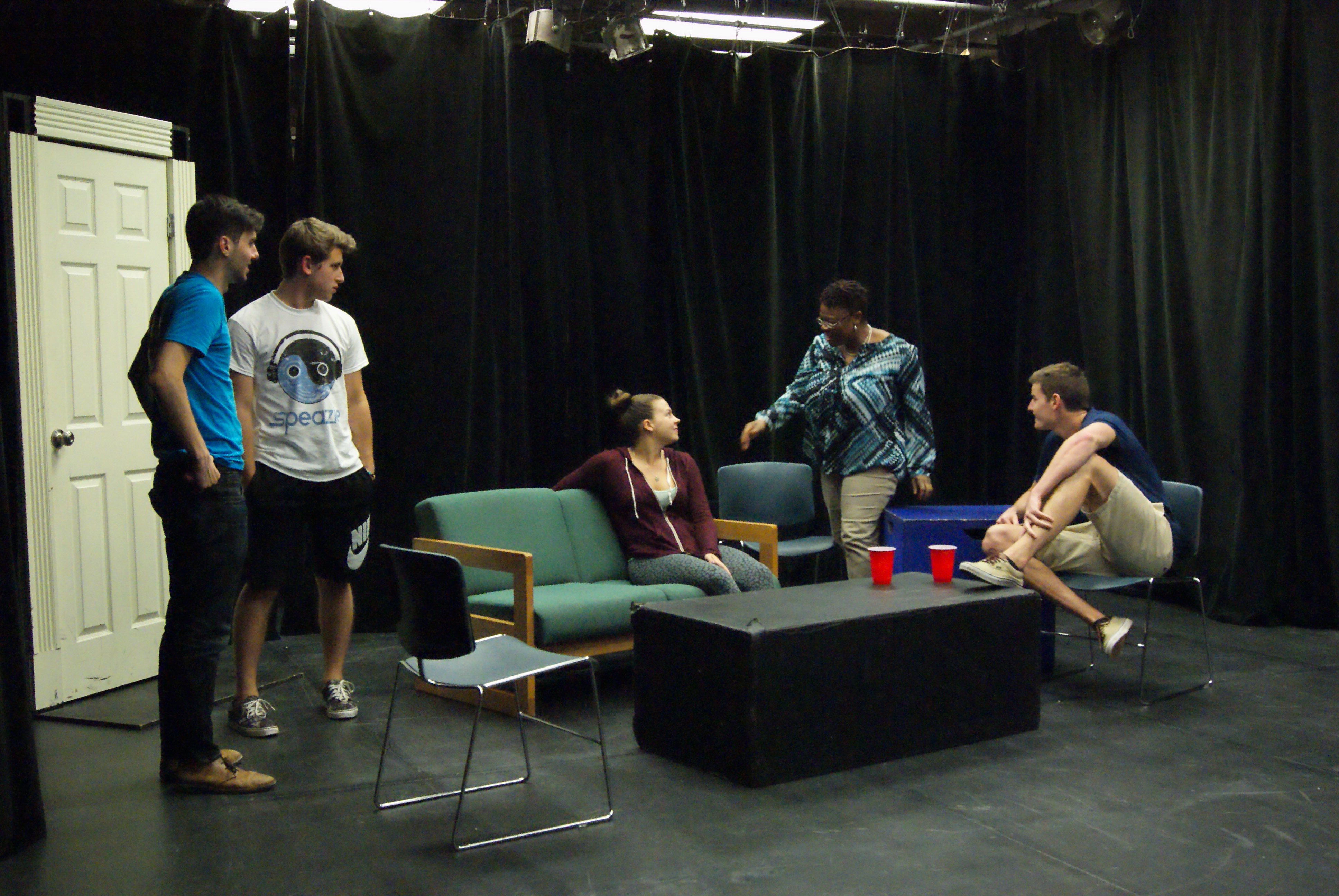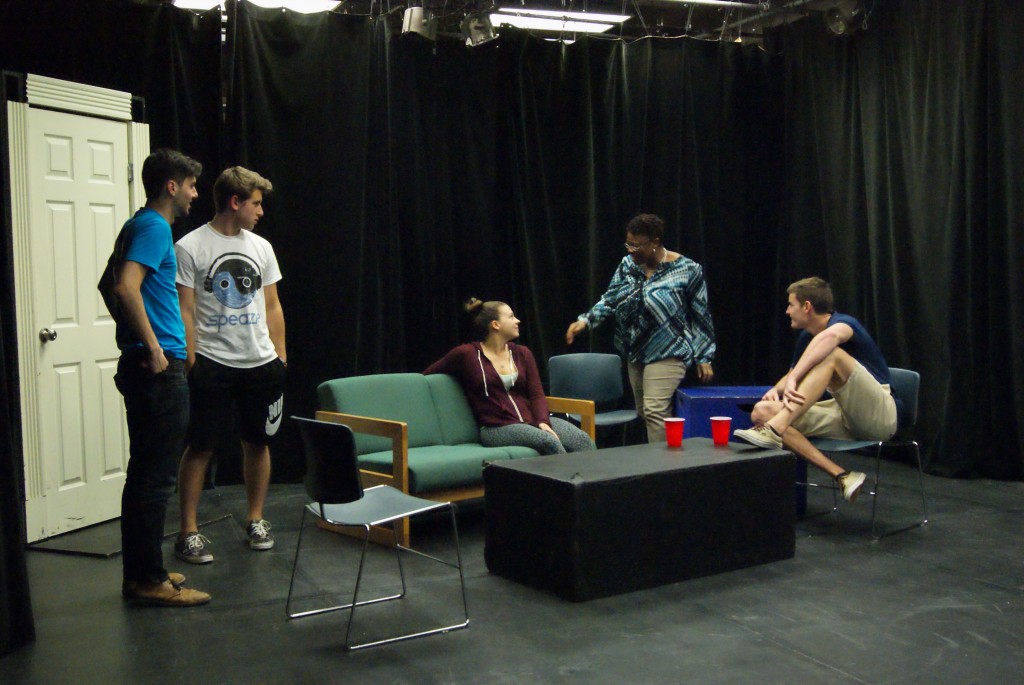

Under the direction of Department of Theatre Arts Professor cfrancis blackchild (Carlia Francis), a group of University of Miami students in the Theatre in Action Devising Ensemble have constructed an interactive theatre production addressing the issues of sexual assault on college campuses. The production encourages audience members to speak up and question the attitudes, language and actions of the characters in the situations they face.
“Changing Conversations” is a forum presentation under the umbrella of Theatre of the Oppressed, which takes the voices of audience members and makes them a part of the theatre experience. Audience members are not just observers, but are also spectator-actors who are encouraged to participate and question the characters.
“Theatre of the Oppressed is theatre that is created within a community. It tries to be very specific to the community,” cfrancis said. “So this is one of the reasons why the students wrote this piece and I didn’t write this piece. It’s because we wanted to talk about sexual assault on campuses from the students’ point of view.”
To inform themselves on sexual assault and consent, the student ensemble researched the topic and had campus resources such as the UM Counseling Center and the Dean of Students Office explain Title IX and speak about the issues and how they relate specifically to UM’s campus. The students then used that information to write the scripts for the four scenes.
“It was very challenging to be confronted with sexual assault cases every night and it was emotionally exhausting,” said Thomas Jansen, a junior majoring in musical theatre. “Once we started writing, the process immediately became a lot more enjoyable because we were all eager to put our newfound knowledge on paper and potentially make a difference. The result of having four original scripts based on our experiences has been the most rewarding part so far.”
The interactive forum theatre in “Changing Conversations” uses a facilitator to introduce the audience to the particular type of theatre, explain the role of spectator-actors and then facilitate the process of questioning the characters.
The performance, which usually runs between eight and 10 minutes, ends without resolution. Upon reaching an impasse, the audience members are asked to take part in the conversation and talk amongst themselves to share thoughts on the issues that were acted out.
“We encourage them to converse to figure out what went wrong and why it went wrong,” cfrancis said. “They then have the ability to talk to the characters and ask them questions.”
When those in the audience speak with the characters, they can ask about particular moments that they found interesting, the characters’ attitudes or their language and the motivations behind those actions.
“Part of the idea that comes out of forum theatre is that what you see in life is never the whole story,” cfrancis said. “It’s always just a snippet of it. And we tend to judge without having all the information, and perhaps if we had all the information our judgements would be different.”
When the scene starts again and the spectator-actors have discussed the situation, the facilitator asks members of the audience to intervene by joining the group on set – whether it be at a party scene or in the classroom – to see if they can help to change the conversation in a way that would be more productive, cfrancis said.
“We’re always amazed and astonished by how interesting each intervention is,” she said. “We’re interested in seeing what the spectator-actor brings to the encounter and how their knowledge and their way of thinking will help change the trajectory.”
The spectator-actor can point something out to the characters about their interactions that they might not have noticed before, paving the way for a change in attitude and helping the characters to address the situation more effectively.
“I think the most interesting part about interactive theater is the fact that the audience can change the outcome of the piece,” Jansen said. “They can come on stage and force the characters to think differently. It’s really helpful in teaching people about real-life situations that are problematic and what they can do to help.”
By addressing situations of sexual assault and encouraging conversation about the characters in the scenes, the cast hopes the message will carry on to similar real-life situations involving college students.
“The topics addressed in ‘Changing Conversations’ are, unfortunately, pretty universal in terms of college students in the U.S. at least,” said Lee Iris Thomas, a junior majoring in theatre arts. “For that reason, I think it’s important that we talk about them … At the end of the day, I hope our performance moves people to discuss these difficult issues more openly, and hopefully they will feel more comfortable speaking up and intervening.”
As the ensemble prepares for its opening night performance on Thursday, the students said that their supervisor and director made it all possible by providing support as they navigated forum theatre and improvisation.
“Once we wrote drafts of scenes, she made us give them more focus and she pushed us to base our characters on real people with realistic backstories,” Jansen said. “The audience has permission to ask the characters anything, so we must be prepared to answer whatever the audience may ask us.”
If You Go
Where: Hecht Studio Theatre, Room 204
When: Nov. 12-14 at 8 p.m., Nov. 14 at 2 p.m. and Nov. 15 at 6 p.m.
A sign up sheet is located in the theatre department lobby on the second floor of Hecht Residential College.





